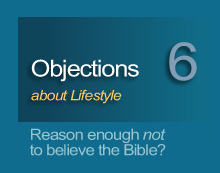"In this film, you've got three different types of people: indifferent people, sympathetic people and people who don't give a rat's ass about God and couldn't care less. That's the way it is in the world."
-
Jim Caviezel on
The Passion of the Christ
"We
are what we
repeatedly do."
- Aristotle
WHY THIS CHAPTER?
This is an honest admission of human nature, and is a testimony to the power of God to change lives.
"I can't change who I am!"
"We get into the habit of living before acquiring the habit of thinking."- Albert Camus
This is absolutely correct. Whatever is unbiblical or ungodly about your life, most of that you cannot change. This is why every 1,000 New Years resolutions usually end up as 999 broken promises. But change is not where God asks you to meet him. What God asks of you is to believe. Believe that God loves you, that Jesus died to secure God's help for you, and that God's Spirit and you together will change that which you alone could not.
This is why salvation begins with simple faith instead of great deeds. You cannot perform great works to earn God's favor because God's favor is never earned. Your works are the result of godly influence, not the cause.
Think of it this way: Imagine a little two-year old, jumping a few inches off the floor trying to reach a cookie jar on top of the refrigerator, yelling, "I'll do it myself." Now imagine that two-year old saying, "Daddy, I can't reach the cookies. Help me!" How much more endearing are the attitudes of humility, respect, and willful dependence than are the attitudes of brash independence and defiance.
Humility and its accompanying attitudes are as endearing to human parents as they are to God our spiritual parent. So contrary to the popular cliché, God does not help those who help themselves; he helps those who admit to him their helplessness.
See also:
What is "righteousness"?
God, evidence, and atheists



Expanded!